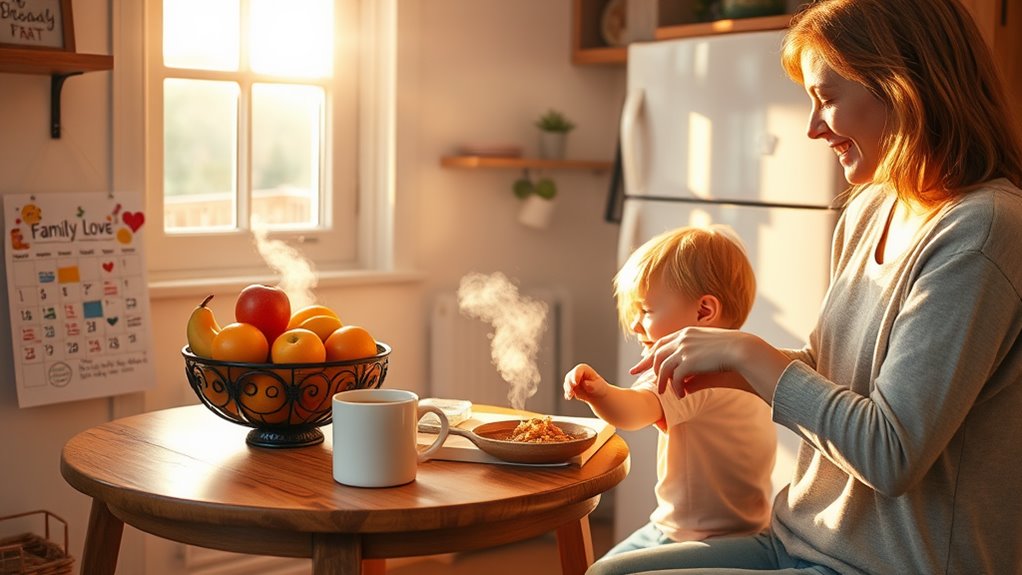Sibling rivalry is as common as peanut butter and jelly, and it can shake up family life in surprising ways. You might find yourself in friendly competition over grades or who gets more snacks, and while it can lead to some squabbles, it also builds teamwork and creativity. Sometimes, it creates feelings of jealousy or anxiety, especially if parents seem to favor one sibling. But don't worry! With open chats and family fun time, you can strengthen those bonds. Understanding this rivalry helps everyone grow stronger together, and there's plenty more to explore about making sibling relationships shine!
Defining Sibling Rivalry
Sibling rivalry is a natural part of growing up, where brothers and sisters often compete for attention, resources, and parental approval.
It's like a never-ending game where everyone wants to score the most points! You might find yourself in a tug-of-war over who gets the last cookie or who plays the best video game. Sometimes, it feels like you're in a race, trying to be the favorite child.
But it's not all bad! Rivalry can also spark creativity and motivation. When you see your sibling excelling at something, it might inspire you to work harder or try new things.
Plus, these little competitions can lead to memorable moments and inside jokes that you'll laugh about later.
Common Causes of Rivalry
Rivalry often stems from various factors that can amplify competition between siblings. For starters, there's the age difference. If you're older, you might feel like you have to take care of your younger sibling, which can lead to some serious eye-rolling and "why do I've to?" moments.
On the flip side, younger siblings often crave attention, wanting to prove they can do just as much as the older ones.
Then there's the classic case of parental attention. If Mom and Dad seem to favor one of you, it can spark jealousy faster than you can say "who gets the last cookie?" Siblings might compete for grades, sports, or even who can build the best LEGO tower.
Another sneaky cause is personality clashes. Sometimes, you just don't get along, and that's okay! Maybe you're the quiet thinker, while your sibling is the loud entertainer.
Finally, friends can play a role too. If your buddy hangs out more with your sibling, it can feel like you're losing out.
Just remember, rivalry is pretty normal, and you'll likely laugh about it one day!
Emotional Effects on Children
Growing up in a competitive household can have a lasting impact on a child's emotional well-being. When you're constantly comparing yourself to your siblings, it can feel like you're in a never-ending race, and not the fun kind! You might find yourself feeling anxious or insecure, wondering if you're good enough, especially if your siblings seem to be winning all the time.
This rivalry can also lead to feelings of jealousy, which isn't a great feeling at all. Instead of bonding with your siblings, you might feel like they're your biggest competition. That can make family gatherings feel more like a battlefield than a fun time together!
On the flip side, some kids thrive in this competitive environment, using it to push themselves to achieve more. But for others, the pressure can lead to frustration and sadness.
It's important to remember that everyone has their own strengths and weaknesses. Finding ways to celebrate those differences can help ease the emotional strain. So, whether you're a star athlete or the family artist, embrace what makes you unique, and remember—you're loved just the way you are!
Impact on Parent-Child Relationships
The emotional strain of competition among siblings doesn't just affect their relationships with each other; it can also have a significant impact on how they relate to their parents. When siblings are busy vying for attention or approval, it can create tension that makes you feel like you're stuck in the middle. You might find yourself caught between your children's antics, trying to keep the peace while they squabble over who gets the last cookie or the biggest hug.
This rivalry can lead to misunderstandings. For instance, if one child feels you favor the other, it can create a wall between you. Kids might think you're playing favorites, and that can hurt their feelings. You might even hear them argue, "Mom loves you more!" It's important to reassure them that you love them both equally, even if they're not convinced.
When you acknowledge their feelings and encourage teamwork, you help build a stronger bond. Try family activities that promote cooperation instead of competition.
Sibling Rivalry Across Different Ages
Sibling rivalry can manifest differently depending on the ages of the children involved. For little ones, rivalry often revolves around sharing toys or attention from parents. You might notice your toddler getting jealous when the baby gets a new toy. It's like they think, "Hey, that's mine!" Even if it's not!
As kids grow, the rivalry can shift to competition in sports, grades, or even popularity. If you've got a teenager, you might hear them arguing about who gets the car first or who's better at math. It can feel like a mini-Olympics in your living room!
During these years, emotions run high, and sometimes they can fight over silly things, like who gets the last slice of pizza. But it's important to remember that these squabbles can help them learn negotiation skills and how to express their feelings.
In the end, sibling rivalry is a normal part of growing up. While it can be annoying, it also teaches valuable lessons about sharing, empathy, and compromise.
Cultural Influences on Rivalry
Rivalry doesn't just stem from age differences; cultural influences play a significant role too. You might notice that in some cultures, siblings are expected to support one another, while in others, competition is the name of the game.
For example, in cultures that value individual achievement, siblings might feel pressured to outperform each other in school or sports. That can lead to some serious sibling showdowns!
On the flip side, in cultures that emphasize family unity, rivalry mightn't be as intense. Here, siblings often work together and celebrate each other's successes. It's a bit like being on the same team, where everyone cheers for one another rather than competing for the spotlight.
Your family's cultural background can shape how you view your role among siblings. Do you see yourself as a protector, a competitor, or maybe even a mediator?
Recognizing these cultural influences can help you understand your own feelings and behaviors. Plus, knowing how culture affects rivalry can help you connect with your siblings on a deeper level.
After all, every family has its unique story, shaped by both love and a little healthy competition!
Conflict Resolution Strategies
Managing sibling conflicts can feel like walking a tightrope, but employing effective resolution strategies can make all the difference.
First, it helps to listen to each sibling's side without interrupting. Everyone deserves to feel heard, even if they're arguing over who gets the last slice of pizza!
Once they've shared their feelings, encourage them to brainstorm solutions together. This way, they'll feel like partners instead of rivals.
Another great strategy is to set some ground rules. You might say, "No yelling or name-calling!" This creates a safe space for everyone to communicate.
If tensions rise, don't hesitate to suggest a timeout. A quick break can help cool down those heated emotions.
It's also beneficial to teach your siblings about compromise. Remind them that sometimes, they might've to give a little to get a little.
Finally, celebrate their successes when they resolve conflicts peacefully. A high-five or a little treat can reinforce positive behavior.
Long-Term Effects on Adult Relationships
Often, the dynamics established in childhood can shape how you interact in adult relationships. If you grew up competing with your siblings, you might find yourself in similar situations as an adult. You might feel the need to compete for attention, love, or even success. This can lead to challenges in forming close connections with friends and partners.
You may also struggle to trust others. If you felt betrayed during sibling squabbles, that feeling can linger into adulthood. You might find it hard to open up or rely on people, fearing they could let you down.
On the flip side, if you learned teamwork and cooperation with your siblings, you could carry those skills into your adult relationships. You might be more likely to communicate openly, share responsibilities, and support your loved ones.
It's all about how you respond to those childhood experiences. So, whether you're managing friendships or romantic relationships, remember that your past can influence your present.
Embracing the good and working through the challenges can help you build stronger, healthier connections as you grow. After all, nobody wants to feel like they're still competing for the last cookie!
Promoting Healthy Sibling Bonds
To promote healthy sibling bonds, it's essential to encourage open communication and shared experiences. You can start by creating moments where your siblings can talk about their feelings and thoughts. It's important to listen without interrupting, even if you don't always agree. Letting them know their opinions matter helps build trust.
Next, try to find activities you all enjoy. Whether it's playing video games, going for a bike ride, or cooking together, shared experiences create lasting memories. You might even discover talents you didn't know your siblings had!
Another great idea is to celebrate each other's achievements, no matter how big or small. A simple "good job" or "I'm proud of you" can go a long way in strengthening your bond.
Don't forget to sprinkle some humor into your relationship. Laughter can break down walls and make tough times easier. Remember, it's okay to disagree sometimes, but always aim to resolve conflicts peacefully.





